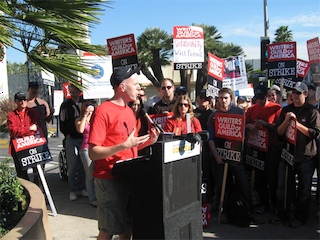Yesterday was the last official day of picketing before the new year. I was happy to see a large contingent turning out at 5:30 a.m. for my home gate at Paramount. Blog reader Andrew brought along his girlfriend Olivia. Since she’s not even a future WGA member, I felt an obligation to promise her that if the UCLA psych-bio majors ever go on strike, I’ll carry a sign at her picket.
Paul Weitz came as well, which gave us an opportunity to talk about the experience of being in the audience at a Sarah Silverman show. Mostly, it’s really funny. And then a moment comes when you realize the boundary between hilarious and offensive has been breached, and you find yourself replaying the last few jokes to figure out exactly when it happened.
I missed the general membership meeting last night in Santa Monica, because (a) we had guests over for dinner, and (b) open microphones make me squirm. I was in bed by nine.
This afternoon, I’m having the Disney Feature Fellows over for a chat about craft and career. It’s a cold, drizzly, sleepy day, which seems perfect for quasi-academic conversation.
In a previous comment thread, reader Paul Ramos (a friend from Boulder) asks…
Is it totally outside of the realm of possibility that the WGA can form its own production house that offers the terms that writers are looking for? Or is it just completely financially un-doable? Why must writers deal with production houses that don’t want to play ball? I realize that these questions probably seem rather naive. But wouldn’t distributors of media still be interested in a movie shot by the WGA vs. by Paramount or some other large production house?
Not naive at all. While the WGA itself can’t be in the movie or television production business (it’s a union which represents writers, rather than employing them), there’s nothing preventing writers from finding alternate sources of funding and setting up their own productions.
And, in fact, that’s [happening as we speak](http://www.latimes.com/business/la-fi-webwriters17dec17,1,299083.story). There are venture capitalists who recognize this as a unique opportunity: you have giant pool of unemployed content creators, and a hungry distribution system (the internet). Depending on the nature of those deals, they would probably need WGA vetting. But there’s a history of alternative deals being reached.
At the Indie Gate last Thursday, I heard it put thusly:
After the first time negotiations fell apart, the message was, “Come back, baby. We can work this out.”
After this last blow-out, the message is slowly becoming, “Maybe we should see other people.”
Look, the strike will end eventually. We’ll go back to working with and for the studios, writing TV series and summer blockbusters that make money for everyone. But we’re at a strange point in time. Certain ideas, certain properties, may not need giant corporations behind them. If you created the next South Park, or the next It’s Always Sunny in Philadelphia, you as the creator might find it more profitable to deliver it through the internet, where the playing fields are much more level.
That’s one irony of the strike: the key issue of internet distribution may become more viable because of the strike itself.
 Yesterday, I braved Actual Sunlight to speak at the Indie Gate gathering at Paramount. It was a great turnout, with a collection of writers expressing a range of opinions, from moderate (me) to far less than moderate (Harlan Ellison).
Yesterday, I braved Actual Sunlight to speak at the Indie Gate gathering at Paramount. It was a great turnout, with a collection of writers expressing a range of opinions, from moderate (me) to far less than moderate (Harlan Ellison).